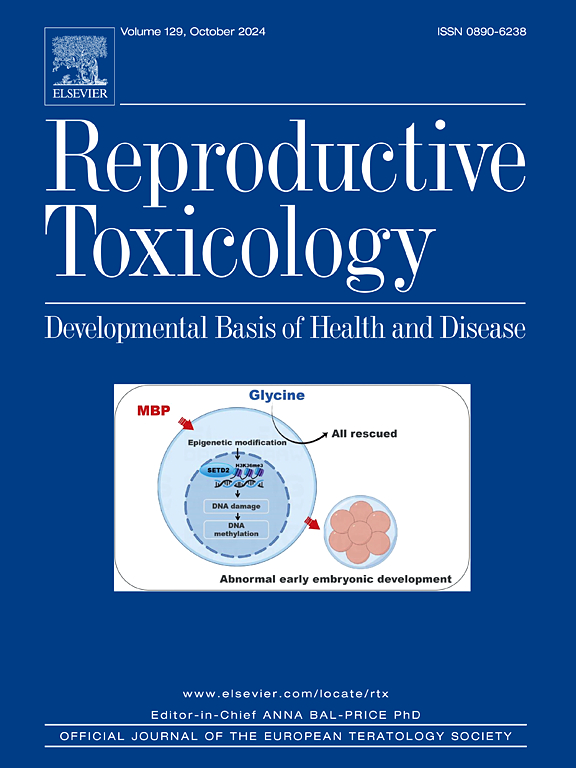Beauvericin在小鼠卵母细胞成熟过程中破坏G2/M转变并诱导减数分裂停止。
IF 2.8
4区 医学
Q2 REPRODUCTIVE BIOLOGY
引用次数: 0
摘要
Beauvericin (BEA)是一种由镰刀菌属真菌产生的真菌毒素,对人类和牲畜造成不良毒性作用。以前的研究已经证明BEA会对猪和幼年羊造成生殖毒性。然而,BEA对细胞分裂的影响及其潜在机制尚不清楚。在这项研究中,我们研究了BEA对完全发育的未成熟小鼠卵母细胞的毒性作用导致减数分裂失败的分子机制。BEA暴露导致DNA损伤,影响磷脂酰肌醇3-激酶/蛋白激酶B/磷酸二酯酶3A (PI3K/AKT/PDE3A)介导的cAMP信号传导,并通过改变Wee1和CDC25B的表达调节CDK1活性,从而抑制细胞周期蛋白依赖性激酶(CDK)复合物(MPF)的激活。这些破坏最终导致体外卵母细胞成熟过程中的生发囊泡阻滞。我们的研究结果表明,BEA治疗通过影响PI3K/AKT/ pde3a介导的cAMP-MPF通路来阻止生殖囊泡破裂,导致哺乳动物卵母细胞减数分裂恢复失败和成熟缺陷。本文章由计算机程序翻译,如有差异,请以英文原文为准。
Beauvericin disrupts G2/M transition and induces meiotic arrest during mouse oocyte maturation
Beauvericin (BEA) is a mycotoxin produced by fungi of the genus Fusarium that causes adverse toxic effects in humans and livestock. Previous studies have demonstrated that BEA causes reproductive toxicity in pigs and juvenile sheep. However, the effects of BEA on meiotic resumption and the underlying mechanisms remain unclear. In this study, we investigated the molecular mechanisms underlying meiotic failure caused by the toxic effects of BEA on fully grown immature mouse oocytes. Exposure to BEA led to DNA damage, affected phosphatidylinositol 3-kinase/protein kinase B/phosphodiesterase 3 A (PI3K/AKT/PDE3A)-mediated cAMP signaling, and inhibited cyclin-dependent kinase (CDK) complex (MPF) activation by modulating CDK1 activity through altered expression of Wee1 and CDC25B. These disruptions ultimately led to germinal vesicle arrest during in vitro oocyte maturation. Our findings suggest that BEA treatment blocks germinal vesicle breakdown by affecting the PI3K/AKT/PDE3A-mediated cAMP-MPF pathway, resulting in the failure of meiotic progression and defects in the maturation of mammalian oocytes.
求助全文
通过发布文献求助,成功后即可免费获取论文全文。
去求助
来源期刊

Reproductive toxicology
生物-毒理学
CiteScore
6.50
自引率
3.00%
发文量
131
审稿时长
45 days
期刊介绍:
Drawing from a large number of disciplines, Reproductive Toxicology publishes timely, original research on the influence of chemical and physical agents on reproduction. Written by and for obstetricians, pediatricians, embryologists, teratologists, geneticists, toxicologists, andrologists, and others interested in detecting potential reproductive hazards, the journal is a forum for communication among researchers and practitioners. Articles focus on the application of in vitro, animal and clinical research to the practice of clinical medicine.
All aspects of reproduction are within the scope of Reproductive Toxicology, including the formation and maturation of male and female gametes, sexual function, the events surrounding the fusion of gametes and the development of the fertilized ovum, nourishment and transport of the conceptus within the genital tract, implantation, embryogenesis, intrauterine growth, placentation and placental function, parturition, lactation and neonatal survival. Adverse reproductive effects in males will be considered as significant as adverse effects occurring in females. To provide a balanced presentation of approaches, equal emphasis will be given to clinical and animal or in vitro work. Typical end points that will be studied by contributors include infertility, sexual dysfunction, spontaneous abortion, malformations, abnormal histogenesis, stillbirth, intrauterine growth retardation, prematurity, behavioral abnormalities, and perinatal mortality.
 求助内容:
求助内容: 应助结果提醒方式:
应助结果提醒方式:


